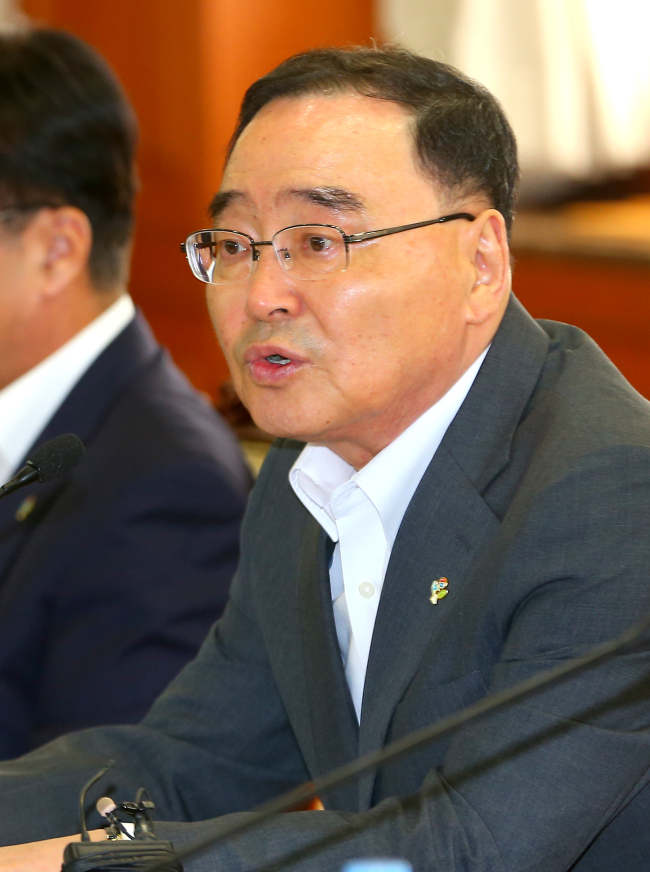Ten days after the Sewol ferry carrying nearly 500 passengers sank on April 16, Prime Minister Chung Hong-won offered to resign, holding himself responsible for the government’s poor initial response to the tragic accident.
Chung, the Park Geun-hye administration’s first prime minister, said on that day that he did not want to be a burden to the government by keeping his job. Shortly afterward, Park accepted his resignation, but asked him to stay in office until a successor was found.
For the last 60 days, Park has tried to find someone to take the nation’s No. 2 post and play a leading role in her reform drive. But all efforts have been for naught, as both of her nominees withdrew amid mounting opposition. Her last resort to escape from the repeated nomination debacles came as a surprise. The president said “after much consideration” that she would keep Chung as prime minister.
Chung, the Park Geun-hye administration’s first prime minister, said on that day that he did not want to be a burden to the government by keeping his job. Shortly afterward, Park accepted his resignation, but asked him to stay in office until a successor was found.
For the last 60 days, Park has tried to find someone to take the nation’s No. 2 post and play a leading role in her reform drive. But all efforts have been for naught, as both of her nominees withdrew amid mounting opposition. Her last resort to escape from the repeated nomination debacles came as a surprise. The president said “after much consideration” that she would keep Chung as prime minister.

Cheong Wa Dae stated that Park turned down Chung’s resignation to prevent further delays in her efforts to unite the nation in the aftermath of the ferry tragedy.
“Many problems exposed in the process of the confirmation hearing have caused a vacuum in state management and split public opinion,” said senior press secretary Yoon Doo-hyun. “The president decided to retain P.M. Chung after much consideration so as to not leave the situation as it is.”
Despite Cheong Wa Dae’s attempt to label the surprising decision as an inevitable choice, a simple but very fundamental question remains: How could Chung, who once called himself a burden to the Park administration, carry out the task of bringing about a new beginning?
Under Park’s government reorganization plan, the prime minister is expected to hold greater authority in managing domestic affairs. The Prime Minister’s Office will supervise two new ministries ― that of national safety and state administration ― which will be responsible for the duties of the Coast Guard, disaster prevention and personnel management.
Sources say Chung had repeatedly declined the president’s offer to stay in office. But on Wednesday evening, Chung changed his mind and accepted. He told reporters that he would serve with “renewed determination,” on the president’s “earnest request” to prevent causing a further vacuum in state management. He vowed to put forth every effort to root out corruption and make the country a safer place to live in. The former prosecutor said he would eradicate abnormal practices, particularly in public offices, a factor said to have led to the deadly disaster.
Both the ruling and the opposition parties appeared vexed over Park’s decision.
“To put it concisely, it is an absurd decision,” said Rep. Park Young-sun, floor leader of the New Politics Alliance for Democracy.
“How far could a car with a flat tire go?” she said of Chung. Others in the opposition party blasted Park’s decision to keep Chung as a sign that she is backtracking from her reform pledges.
Meanwhile, some Saenuri lawmakers declined to make specific comments on Park, but said the decision was “surprising” and “inappropriate.”
Rep. Lee Wan-koo, floor leader of the Saenuri Party, said he understood the president’s decision, adding that the process to produce yet another new figure could take more than a month.
Some people may learn best from bitter experience. And Chung may have gone through dire hardships in the past two months ― angry victims’ families even threw water in his face and blocked his car at the harbor near the accident site. But it remains to be seen how Park will steer her reform drive through Chung, himself a reminder of the government’s bungled response to the sunken ferry and the crisis that ensued.
By Cho Chung-un (christory@heraldcorp.com)
-
Articles by Korea Herald







![[KH Explains] How should Korea adjust its trade defenses against Chinese EVs?](http://res.heraldm.com/phpwas/restmb_idxmake.php?idx=644&simg=/content/image/2024/04/15/20240415050562_0.jpg&u=20240415144419)












![[Today’s K-pop] Stray Kids to return soon: report](http://res.heraldm.com/phpwas/restmb_idxmake.php?idx=642&simg=/content/image/2024/04/16/20240416050713_0.jpg&u=)